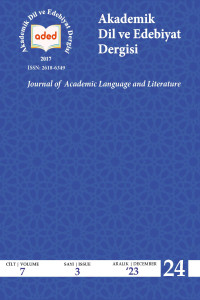Abstract
Cumhuriyet döneminin ilk kadın şair, yazar ve eğitmenlerinden Şükûfe Nihal toplumsal tarihin önemli kırılma noktalarına tanıklık ederek kaleme aldığı eserlerinde sosyal meselelere duyarlığını ortaya koyar. Yazar, bu çalışmada tahlil edilen Yalnız Dönüyorum adlı romanında 1908-1930 yılları arasında yaşanan toplumsal değişimin kadın bireylerin kimlik inşasına etkilerini biyografik bilgi ve tarihsel gerçekliğe dayanan unsurlar aracılığıyla yansıtır. Meşrutiyet, Mütareke dönemi, Kurtuluş Savaşı ve Cumhuriyetin kuruluş yıllarında hürriyet ve eşitlik arayışları romanda Yıldız’ın millî kimlik ve benliğe dair düşünceleri aracılığıyla aktarılır. Romanda mutsuz bir evlilik anlatılırken bireysel tarih ile toplumsal tarihe eş zamanlı ayna tutulur. Bu çalışmada kadın ve kadınlık tanımları, toplumsal cinsiyet rolleri, evlilikte iktidar ilişkileri, toplumsal vazife hususlarının romanda ele alınışı feminist edebiyat eleştirisi ışığında irdelenecektir. Yazarın sosyal meselelere dair savunduğu tezler kadın kimliğinin inşası odak kılınarak değerlendirilecektir. Ulus devlet inşasında ön plana çıkan “yeni hayat” konusuna Yıldız’ın eleştirel yaklaşımı ortaya konulurken “yeni kadın” imgesinin kurmacadaki izleri sürülecek Yıldız’ın kişilik gelişiminde cinsler arasındaki hiyerarşilerin etkisi sorgulanacaktır. Ahlaki çöküşün ve yozlaşmanın tasvir edildiği romanda bilgili ve kültürlü aydın kadınların idealize edilmesinde milliyetçilik ideolojisinin etkisi dikkat çekmektedir. Olumlu ve olumsuz kadın portreleri toplumsal sorunlara dair duyarlık ölçütü ile keskin çizgilerle ayrılırken modern kadın imgesinin romanda nasıl sorunsallaştırıldığı Yıldız’ın kimlik inşası odağında ele alınmaktadır.
References
- Adak, H. (2020). Otobiyografik benliğin çok-Karakterliliği: Halide Edib’in ilk romanlarında toplumsal cinsiyet. (Irzık S.& Parla J. Derl.) Kadınlar dile düşünce. (161- 178). İletişim Yayınları.
Abstract
Şükûfe Nihal, one of the first female poets, writers and educators of the period of the Republic, reveals her sensitivity to social issues in her works by witnessing the important breaking points of social history. In her novel, Yalnız Dönüyorum (I'm Returning Alone) which is analyzed in this study, she reflects the effects of the social change between 1908-1930 on the identity construction of female individuals, with elements based on biographical information and historical reality. The search for freedom and equality during the Second Constitution, the Armistice period, War of Independence and the founding years of the Republic are conveyed through Yıldız's thoughts on national identity and self. While describing an unhappy marriage in the novel, individual history and social history are simultaneously mirrored. In this study, the definitions of women and femininity, gender roles, power relations in marriage, and social duty issues will be examined in the light of feminist literary criticism. The thesis defended by the author on social issues will be evaluated by focusing on the construction of female identity. While Yıldız's critical approach to the "new life" issue, which comes to the forefront in the nation-state building, is revealed, the traces of the "new woman" image in fiction will be traced and the effect of hierarchies between the sexes on Yıldız's personality development will be questioned. In the novel, in which moral collapse and corruption are depicted, the effect of nationalism ideology draws attention in the idealization of knowledgeable and cultured intellectual women. While positive and negative female portraits are separated with sharp lines by the criterion of sensitivity to social problems, how the modern woman image is problematized in the novel is addressed in the focus of Yıldız's identity construction.
References
- Adak, H. (2020). Otobiyografik benliğin çok-Karakterliliği: Halide Edib’in ilk romanlarında toplumsal cinsiyet. (Irzık S.& Parla J. Derl.) Kadınlar dile düşünce. (161- 178). İletişim Yayınları.
Details
| Primary Language | Turkish |
|---|---|
| Subjects | Modern Turkish Literature in Turkiye Field |
| Journal Section | Articles |
| Authors | |
| Publication Date | December 30, 2023 |
| Submission Date | July 13, 2023 |
| Acceptance Date | November 12, 2023 |
| Published in Issue | Year 2023 Volume: 7 Issue: 3 |

